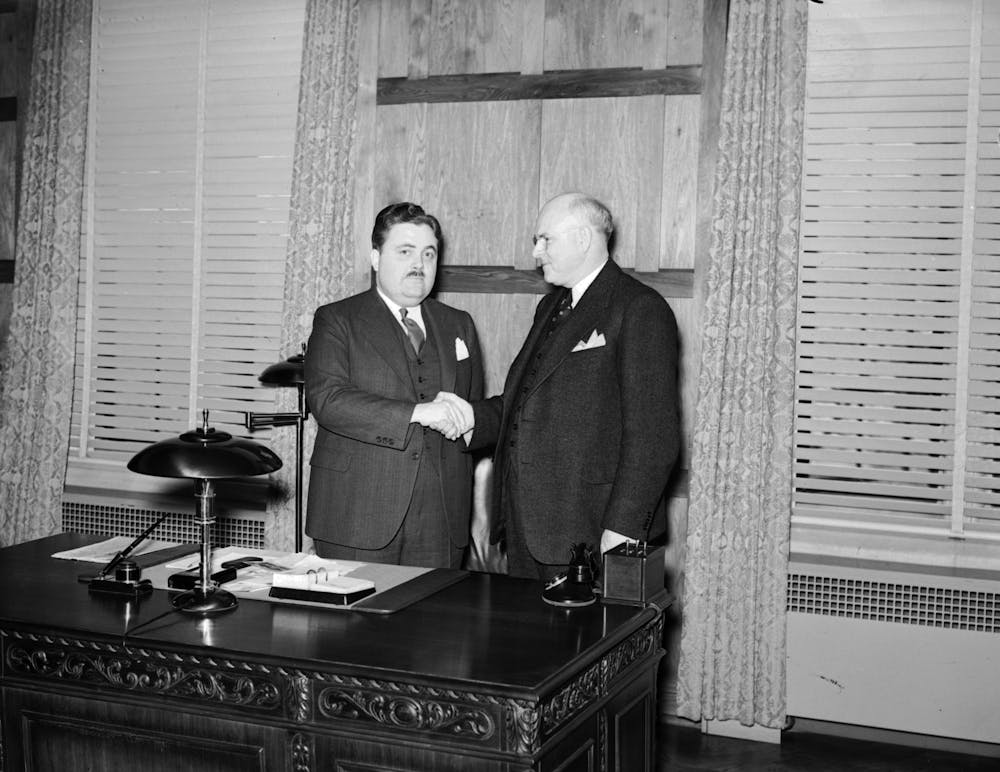Eric Langowski's grandmother was incarcerated in an internment camp for Japanese Americans during World War II. Today, a petition written by Langowski, class of 2018, and IU associate history professor Ellen Wu presses IU to recognize its role in Japanese American exclusion.
They will present the petition to IU's Board of Trustees, President Michael McRobbie and Provost Lauren Robel before the Japanese American Day of Remembrance on Feb. 19. It demands IU admit to its racist exclusionary past, issue retroactive diplomas to about a dozen Japanese American students who were denied admission between 1942 and 1945 and provide funding for research and education on Japanese American incarceration.
There is no way to fully rectify the exclusion of Japanese American students during Japanese internment, but the least IU and McRobbie can do is fulfill the petition’s demands. The university should recognize the injustice it committed against not just the denied applicants, but Japanese Americans as a whole — IU set the precedent for other surrounding colleges to reject Japanese American applicants, Langowski said.
Langowski said the demands listed in the petition are a way of getting reparations from IU for those who were denied an education, including some who were particularly in danger of being incarcerated in internment camps in the west. This petition is also crucial to raising awareness of IU’s ugly past.
According to a paper written by Langowski and published in the Indiana Magazine of History, IU’s Board of Trustees ruled in May 1942 that “no Jap. be admitted to Indiana University.”
Ora L. Wildermuth, president of the Board of Trustees at the time, said Japanese people were fundamentally different from America’s European wartime enemies.
“As I see it, there is a difference in Japanese and Germans or Italians — they are Aryans and can be assimilated but the Japanese can’t — they are different racially,” Wildermuth said. “I can’t believe that any Japanese, no matter where he was born, is anything but a Japanese.”
Wildermuth’s name was removed from the Intramural Center last year due to his opposition to racial integration.
Herman B Wells, who was president of IU at the time, approved scholarships for refugee students from European countries, including Germany. However, for students of Japanese descent, Wells only approved a letter to be sent to rejected applicants, signed HBW.
This revelation about the exclusion of Japanese Americans during an era of internment certainly complicates Wells’ legacy.
“You see that there’s Wells the person and Wells the administrator, and Wells the administrator was beholden to Wildermuth, the president of the trustees,” Langowski said. “Everything we know about Wells suggests he would have been against this, but he wasn’t.”
Not correcting this mistake would tarnish McRobbie’s legacy as president as well. Wildermuth’s anti-Japanese comments were cited by McRobbie as a reason to remove his name from the Intramural Center, Langowski said, but no more has been done to remove Wildermuth’s legacy from IU since.
The kind of racist vitriol expressed by Wildermuth may seem like a mere product of its era, but this is too generous. At the time, dissenters at IU spoke out against the ban of Japanese American students .
An Indiana Daily Student article published Oct. 14, 1942, addressed a town hall meeting in which IU students voiced their negative opinions of Japanese Americans.
“It seems that these students have overlooked a bulwark to democracy: logical thinking,” according to the article. “We don’t profess to be the judge of the Japanese students question, but we do know this: We are learning to hate all Japanese people.”
Wu said this part of IU’s history is still relevant today because the consequences of such monumental mistakes are still felt generations later, especially considering Bloomington’s recent controversy over white supremacy.
“I think this is a really powerful opportunity for our university to have a useful conversation about how racism gets almost normalized, or how people make essentially racist decisions and people go about their business,” Wu said.
What could IU possibly do to create a safe and inclusive learning space without recognizing its denial of prospective Japanese students in the past? There is no way to turn back time and reverse this legacy. However, IU must do what it can to rectify it, starting with answering the demands of this petition.
Abby Malala (she/her or they/them) is a senior studying cinema studies. She wants to become a writer (and get paid for it) in the future.





